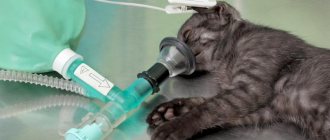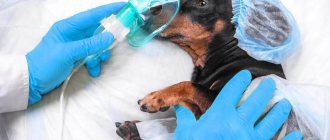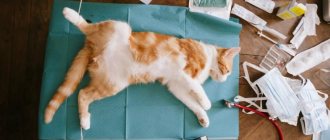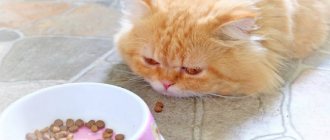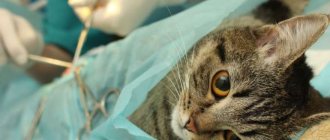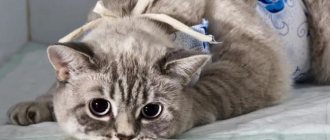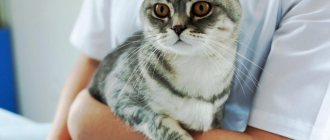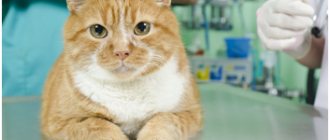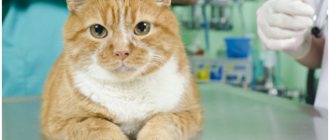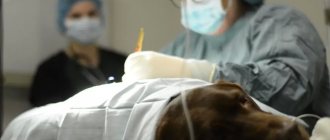9795Administration
Castration is an operation during which the testes are removed from cats, after which the animal does not experience sexual attraction to females. Castration is carried out under anesthesia, and animal owners are interested in the question: “How long does it take a cat to recover from anesthesia after castration?”
Even a veterinarian cannot give an unambiguous, accurate answer to this question, because it depends on the age and individual characteristics of his body. The older he is, the longer it will take to recover from anesthesia, so it is advisable to castrate your pet at a young age.
On average, a cat recovers from anesthesia after castration from 2 to 12 hours.
Young and active animals begin to try to stand up and crawl within a couple of hours, while calmer pets can lie motionless for several hours. With the correct calculation of the drug for the animal, the pet will recover from anesthesia in 2-8 hours, but if it does not try to move for more than 8 hours, it is necessary to consult the doctor who performed the castration. For cats, they do not use ordinary anesthesia, but special drugs, under the influence of which their sensitivity is reduced, but their eyes remain open.
© shutterstock
How long does a cat sleep after anesthesia?
The duration of anesthesia sleep in cats and the recovery period depends on various aspects. The drug used and the method of introducing the animal into a state of sleep are taken into account.
If short-acting drugs are used, the condition required to perform the operation occurs quickly and the effect on the pet’s body stops just as quickly. Their scope of application is limited:
- dental procedures;
- nail removal;
- castration.
In general, they are used when a simple operation is required.
The modern method of gassing cats makes it possible to prepare the pet for surgery and, after just a couple of hours, return it to its original state. If deeper anesthesia is used, the period of postoperative sleep can reach eight hours.
If the veterinarian deems it necessary, he may recommend leaving the fluffy in the clinic for a while. Doctors not only know how to help a cat recover from anesthesia, but can also help the baby if breathing or heart problems arise.
In addition, a temporary hospital is a reason to save nerves, both yours and the animal’s. After all, when fluffies recover from anesthetized sleep, they can behave inappropriately. If you do not understand the methods that can normalize the animal’s psyche, the pet can be harmed, and the owners themselves will not be better off from the animal’s abnormal behavior.
When leaving the clinic, ask your doctor how long your pet will have to wean off the drug used in this case. Since the deadlines can be in a significant range of time, this question will be relevant.
Abnormal stool
After surgery, the cat's intestinal function may be disrupted and constipation or diarrhea may appear, which is accompanied by pain and brings additional suffering to the animal. You need to pay attention to the following signs:
- refusal to eat;
- plaintive meow;
- absence of acts of defecation;
- periodically appearing trembling of the back of the body.
If your cat is constipated, you need to purchase a laxative for her on the recommendation of a veterinarian and change her diet. At home, you can use regular Vaseline.
Diarrhea occurs after exposure to toxins contained in anesthesia . In this case, the cat should limit drinking and feeding and use medication prescribed by the veterinarian. At home you can drink rice water.
© shutterstock
Cat and cat after anesthesia - features of the condition
We have already figured out that the animals sleep for some time after the operation. But after the cat regains consciousness, its brain will remain under the influence of a sleeping pill for about a day, like ketamine, which is used to put the whisker to sleep.
Most often, a cat looks sleepy after anesthesia. She may have gag reflexes, and problems with coordination of movements and speed of reaction may also arise. An increase in temperature along with chills may also be noticed.
In some cases, you can see the following picture: the animal comes to its senses, gets up, walks a few steps and collapses. A cat after anesthesia may also move its paws, as if it is rushing somewhere, or it will bump into an obstacle and begin to try to move it with its head.
It doesn’t matter how your cat feels after anesthesia, or how long it takes before it returns to normal, you need to provide the animal with a warm bed. Just don’t use a sofa or chair for these purposes. A disoriented animal can easily fall over.
Since your pet can vomit and even wet himself, be prepared for anything. In principle, this is almost normal, but if the vomiting does not stop for a long time (more than a day), the cat should be taken to a veterinary clinic.
Regarding high temperatures, periodically feel your pet's nose. If it is hot and dry, the animal has a fever. There is no need to see a doctor right away, but, as in the case of vomiting, if the fever persists, the cat should be taken to an appointment.
Another task of the owner in the post-anesthesia period is to ensure peace and safety. Usually, if the doctor’s recommendations for care are followed, after a day the animal should return to normal. Playfulness will return, the desire to eat and other indicators will return.
Caring for a neutered cat by day
After the operation, the animal should be placed on its side, transported home and provided with a bed on the floor. It is recommended to cover him with a blanket, since due to the decrease in body temperature there is a risk of hypothermia. The pet needs to be covered with an absorbent diaper and periodically close its eyes, protecting them from drying out. The problem of dry sclera can be solved with the help of eye drops. When the cat wakes up and begins to try to get up, he should be put back, stroking and calming him. It is recommended to massage the paws to restore blood flow.
During the first day, the animal will refuse to eat, and during this period it is important to prevent dehydration. The cat should not be forced to drink, as it may vomit, but water in a small volume will not provoke vomiting, so 10-15 drops of liquid should be periodically instilled into the mouth.
On the second day, with proper care, pets become more alert. For the first 48 hours, a family member must be with the cat. It should not jump to a height, be located in a draft or near heaters. For 4–6 days, the wound should be examined and periodically treated with an antiseptic (hydrogen peroxide, chlorhexidine, furatsilin). On the advice of a doctor, it is allowed to use wound healing ointments and gels.
The pet may begin to lick the wound; to prevent this, you need to put a special collar on the cat. It is allowed to be removed only during feeding. The animal can also rub the wound on the floor; to prevent it from becoming infected, you need to use a diaper, cutting a hole in the back for the tail. The smallest baby diapers or special products for animals will do. The cat does not have to be in a diaper all the time; it can be used while the animal is especially actively trying to lick itself.
How cats recover from anesthesia after castration
Castration is considered a simple and common procedure. Many owners of mature animals consider surgery a good solution. And to some extent they are right. The small predator not only does not lose its natural nature, but also gets the opportunity to avoid melancholy during the period of sexual hunting or hormonal problems from taking medications. An additional benefit of neutering applies to outdoor pets. Thanks to the operation, the number of stray kittens is reduced, and the animal itself is reliably protected from infections transmitted from street cats. In addition, a neutered pet does not lose social significance for other representatives of its tribe. But this is a separate topic for conversation, and we will find out how long it takes a cat to recover from anesthesia after castration, and what to expect.
It’s worth making a reservation right away - not a single veterinarian will give a definite answer. Each cat’s body is an individual and it is not 100% possible to calculate the animal’s reaction to the drug. For example, a surgeon may claim that the effect of the drug will last no more than three hours, but in fact the animal will lie motionless for 7-8 hours. By the way, anesthesia for a cat and a person are different procedures. The most common drug used for animals is to freeze the nerve endings. In this case, the pet's eyes may remain open.
Don’t panic if your cat takes a long time to recover from anesthesia after castration, it’s better to check his condition. To do this, you can shine a light into your pet's eyes. If the animal starts to squint, you can hold its eyelids. Ideally, the animal's pupils should begin to constrict. If this does not happen, things are bad. In this situation, you must immediately contact the surgeon who performed the operation. There is no point in contacting another doctor, because he does not know the dosage of the drug, nor does he know its name.
If you are embarrassed that the cat is recovering from anesthesia for a long time, but, nevertheless, is active: its paws and tail are twitching - this is normal. Not every pet strives to return to a full life after surgery. Some animals prefer peace, quiet and sleep. From their point of view, this way of moving away from the procedure is better than others.
Inhalation anesthesia for rodents and ferrets
The most delicate pets at Alisavet are given inhalation anesthesia.
All three stages of creating gas anesthesia are carried out on these animals. However, there are small peculiarities here.
Inhalation anesthesia for small rodents is also carried out after premedication. In hamsters and rats, a tube is not inserted into the trachea, so the gas mixture enters through a special mask.
Ferrets and large rodents (guinea pigs, rabbits) are first given premedication, after which an intravenous catheter is installed, and then a gas mixture is also supplied using special masks.
03/09/18 Anesthesia for rabbits. Inhalation (gas) anesthesia
How to behave when a cat recovers from anesthesia, what to do?
Some people advise washing the animal in warm water, but this is not a necessary procedure. Yes, the animal really needs warmth, because it has temporary problems with blood circulation and heartbeat. But to warm the animal, a warm blanket or terry towel is enough.
You can also lightly massage the cat's paws to stimulate blood flow. But all this is suitable for pets in anesthetized sleep. When the cat wakes up, you can warm it up in the standard way - with your body. But it is worth considering that not every animal will be happy with a forced hug. Some pets prefer to be alone at this time.
There is no need to worry if your cat vomits - this is a common occurrence. An animal can vomit bile even on an empty stomach. Therefore, do not place your pet on the sofa or armchair to avoid contamination. In addition, after anesthesia, the cat may temporarily lose control of its bladder. If this happens in your case, you may notice a foul odor from the urine. This is also normal - hormones come out.
It doesn’t matter how the cat recovers from anesthesia after castration, good or bad, at first he’s unlikely to want to eat. Therefore, do not try to give your pet a treat or give him something to drink. When the pet recovers, it will start eating on its own. By the way, many cats gain weight after castration.
In general, your cat needs simple things after neutering:
- attention;
- warm;
- peace.
These are the main components of successful rehabilitation.
Positive aspects of the operation
Those owners of domestic cats who have finally decided to neuter their pet often ask whether there are any positive aspects to this operation. In fact, there are quite a few of them:
- the cat stops marking its territory (in some animals this function does not completely disappear, but marks appear much less frequently, and their smell becomes less pungent);
- cat “concerts” are stopped;
- the animal becomes calmer, aggression disappears;
- friendly relations are established between him and other animals in the house;
- the cat, having lost interest in the opposite sex, becomes more attached to the owner and plays with children with great pleasure.
Obesity, which so often accompanies castration, is not at all inevitable. This is not a complication or a consequence of the operation, but just errors in nutrition - by the way, easily eliminated.
In order for your pet to remain in excellent shape after castration, do not neglect the advice of veterinarians: fewer calories and more exercise. Health to you and your pets!
When to call a doctor
Most often, a cat feels satisfactory after anesthesia. Side effects do occur, but most often they are short-term. However, there are a number of signs, if they persist, you should urgently take your pet to the veterinarian:
- pallor, blueness, redness of mucous membranes;
- irregular heart rhythm, weak, twitching pulse;
- temperature disturbance, lack of reaction to touch;
- you see that your pet is feeling unwell, this can be reflected in everything.
Contact your veterinarian, even if it's midnight. After all, anesthesia seriously strains the pet’s heart and respiratory organs. Timely help is sometimes the only chance to save a cat’s life.
What signs should alert the owner
In the vast majority of cases, castration of a cat takes place without any consequences. However, it is worth remembering three very dangerous symptoms that should alert you:
- increased body temperature on the third day after surgery;
- lack of appetite in the first three days after surgery;
- the presence of inflammation, slight bleeding or discharge from the sutures.
All these signs may indicate a developing complication, which only an experienced specialist can identify and provide qualified assistance.
How long does it take for a cat to come to its senses?
As a rule, after surgery the cat can sleep for up to 3-5 hours. This is fine. Then she will be unsteady, she will have other oddities (she will refuse the treats that she loves very much, she will drink a lot). However, your favorite mustachioed beauty will come to her senses around the second or third day.
Important!
Until the cat returns to its previous life activities, it should under no circumstances be left unattended!
